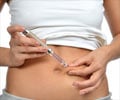Sales of anti-diabetic medicines, including insulin, oral drugs have increased since 2008 due to the growing diabetic population and availability of drugs.

TOP INSIGHT
Most Indians pay out of their pocket and nearly seven percent experience catastrophic expenditure for diabetes.
The spike could be attributed to the rising number of patients, increased availability and aggressive marketing by pharmaceutical companies.
On the other hand, the affordability and accessibility of the anti-diabetic therapy to lower socio-economic strata remained inadequate, the study said.
"Increasing sales of high cost medications as shown by our data are particularly worrisome since most Indians pay out of their pocket and nearly seven percent experience catastrophic expenditure for diabetes," Misra said.
According to the World Health Organization (WHO), the number of adults suffering from diabetes has risen from 4.7 percent of the global population in 1980 to 8.5 percent in 2014.
"India has to take several stringent measures to ensure that there is a balancing mechanism in place, education of physicians, tighter regulations on price control and stricter norms for pharmaceutical companies around new drugs and marketing ethics," Misra added.
Source-IANS
 MEDINDIA
MEDINDIA




 Email
Email










